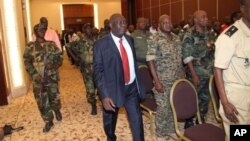BANGUI —
Central African Republic's new President Michel Djotodia, who seized power last week, said on Friday he would review resource deals signed by the previous government and promised to step down at elections in 2016.
Djotodia, a former civil servant turned rebel leader, said he would seek aid from former colonial power France and the United States to retrain the ill-disciplined army, which was easily overrun by fighters from his Seleka rebel coalition.
Paris and Washington have called for the rebels to respect a power-sharing deal signed in the Gabonese capital Libreville in January which mapped out a transition to elections in 2016 at which then-President Francois Bozize was forbidden from running.
"We are going to act according to the spirit of the Libreville agreements," Djotodia told his first news conference since seizing power. "Anyone currently in power supporting our takeover will not contest the next presidential elections, myself included."
The rebel takeover has been strongly condemned internationally. The African Union suspended Central African Republic's membership and imposed sanctions on Seleka leaders, including Djotodia.
In a bid to tap the country's under-exploited mineral wealthy, Bozize had awarded China National Petroleum Corp (CNPC) rights to explore for oil at Boromata, in the country's northeast near the border with Chad.
South Africa's DIG oil is also prospecting in the southeast of the country, near the town of Carnot.
"I will ask the relevant ministers to see whether things were done badly, to try to sort them out," Djotodia said, when asked about resource licenses awarded to Chinese and South African firms by Bozize.
Bozize, who fled to Cameroon immediately after the coup, has requested asylum in the West African nation of Benin, Foreign Minister Nassirou Bako said.
"He has not yet arrived in Cotonou and everything indicates he is still in Cameroon," Nako said late on Thursday.
Change of direction
Although Central African Republic has deposits of gold, diamonds, oil and uranium, these remain largely untapped, and the coup-prone nation is one of the poorest on earth.
"We will rely on the European Union to help us develop this country," Djotodia said, adding that about 80 percent of the country's foreign aid has come from the bloc. "When we have been sick, the European Union was at our bedside. It will not abandon us now."
Bozize, who fled to Cameroon, has requested asylum in the West African nation of Benin, a senior official with Benin's foreign ministry official said this week.
Djotodia, a former civil servant turned rebel leader, said he would seek aid from former colonial power France and the United States to retrain the ill-disciplined army, which was easily overrun by fighters from his Seleka rebel coalition.
Paris and Washington have called for the rebels to respect a power-sharing deal signed in the Gabonese capital Libreville in January which mapped out a transition to elections in 2016 at which then-President Francois Bozize was forbidden from running.
"We are going to act according to the spirit of the Libreville agreements," Djotodia told his first news conference since seizing power. "Anyone currently in power supporting our takeover will not contest the next presidential elections, myself included."
The rebel takeover has been strongly condemned internationally. The African Union suspended Central African Republic's membership and imposed sanctions on Seleka leaders, including Djotodia.
In a bid to tap the country's under-exploited mineral wealthy, Bozize had awarded China National Petroleum Corp (CNPC) rights to explore for oil at Boromata, in the country's northeast near the border with Chad.
South Africa's DIG oil is also prospecting in the southeast of the country, near the town of Carnot.
"I will ask the relevant ministers to see whether things were done badly, to try to sort them out," Djotodia said, when asked about resource licenses awarded to Chinese and South African firms by Bozize.
Bozize, who fled to Cameroon immediately after the coup, has requested asylum in the West African nation of Benin, Foreign Minister Nassirou Bako said.
"He has not yet arrived in Cotonou and everything indicates he is still in Cameroon," Nako said late on Thursday.
Change of direction
Although Central African Republic has deposits of gold, diamonds, oil and uranium, these remain largely untapped, and the coup-prone nation is one of the poorest on earth.
"We will rely on the European Union to help us develop this country," Djotodia said, adding that about 80 percent of the country's foreign aid has come from the bloc. "When we have been sick, the European Union was at our bedside. It will not abandon us now."
Bozize, who fled to Cameroon, has requested asylum in the West African nation of Benin, a senior official with Benin's foreign ministry official said this week.





